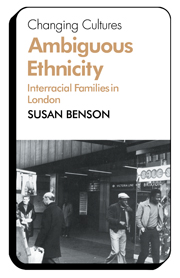Ambiguous Ethnicity: Interracial Families in LondonPosted in Books, Family/Parenting, Identity Development/Psychology, Media Archive, Monographs, Social Work, Teaching Resources, United Kingdom on 2011-01-17 01:51Z by Steven |
Ambiguous Ethnicity: Interracial Families in London
Cambridge University Press
January 1982
184 pages
216 x 140 mm, 0.24 kg
Paperback ISBN: 9780521297691
Susan Benson
In a society where race is a significant component of social identity and exerts an important influence on social relationships, the problems faced by couples who enter into ‘mixed’ marriages are especially difficult. The book is a study of the personal histories and everyday lives of a small number of interracial families living in and around Brixton, south London, in the early 1970s. Dr Benson sets the circumstances that confront these families within the context of wider British attitudes about race, colour and miscegenation as they developed over time. She argues that couples are obliged to make a continual series of choices between ‘black’ and ‘white’ in the course of their everyday lives. Through a discussion of these choices and of the factors which lead individuals to enter into a marriage which could be regarded with some disapproval, the book explores how people in London thought and felt about race, colour and social identity. It will be of interest to all teachers and students studying race relations, as well as to social and community workers, school teachers and administrators concerned with race relations and the inner city.
Table of Contents
- List of maps and diagrams
- Preface
- 1. Racial intermarriage in England
- 2. The pattern of interracial unions in England today
- 3. Introducing Brixton and the borough of Lambeth
- 4. The social world of Brixton
- 5. The dynamics of interracial marriage choice
- 6. Coping with opposition: the reactions of family and friends
- 7. The construction of a domestic world
- 8. The construction of a social universe
- 9. Living in a divided community
- 10. Parents and children
- 11. Concluding remarks
- Appendix 1. The research project: development and methodology
- Appendix 2. The calculation of births by parental ethnic origin
- References
- Index

